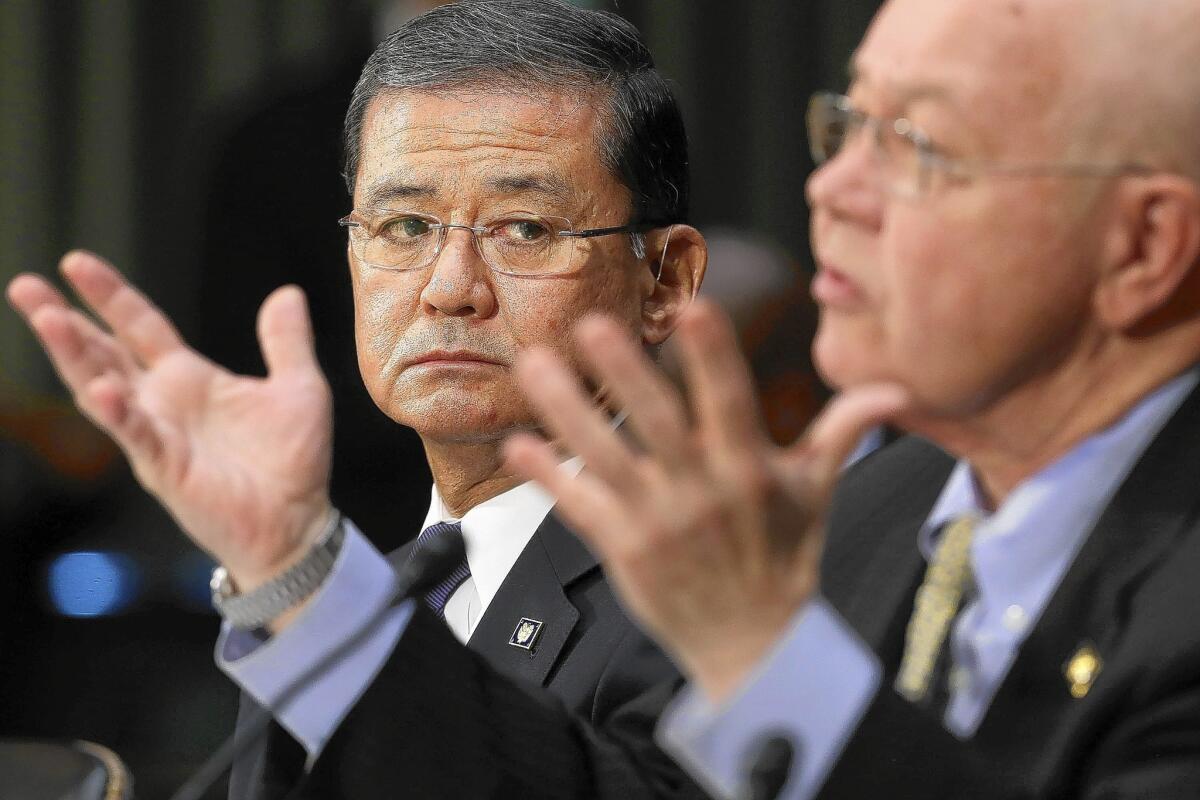Readers React: Fix the VA

That we ask and expect men and women to serve our country in the most demanding ways possible and then turn our backs on them when they return is unconscionable. Our veterans have earned our care and support. (“Growing evidence points to systemic troubles in VA healthcare system,” May 18)
What your report describes is not a portrait taking shape; rather, it is a chronic state of deprivation.
That 90% of veterans express a positive view of the treatment they receive demonstrates that high-quality treatment can be provided.
What may also be true is that receiving “care” in such a dysfunctional system can alter one’s perception of reasonable healthcare. This is illustrated by one veteran’s statements that although he waits six to eight weeks for an appointment, “the VA is saving my life.”
It is professionally and morally unacceptable that anyone be made to endure the deplorable treatment the veterans in your article have received.
Kathleen V. Williams
Los Angeles
There are problems with our healthcare delivery system, problems that neither the Republicans nor the Democrats have been willing to address without consideration of politics first and healthcare policy second.
We are now in the midst of a series of horrendous revelations about problems and coverups in Department of Veterans Affairs hospitals. To those who advocate a single-payer, government-run healthcare system, this should be proof positive that this is not the solution to our problems.
What we need is for Congress to admit that it is incapable of solving these problems and to turn them over to a commission consisting of experienced experts from all aspects of healthcare; they would craft a report that lawmakers could then accept or reject in its entirety, as it did with the military base closure commission.
Then we could have a fair chance of solving these problems.
Richard F. Corlin, MD
Santa Monica
The writer is past president of the American Medical Assn.
Veterans with service-connected disabilities could benefit from referral by an “overworked” VA to community resources, as exemplified by a disabled Vietnam veteran for whom I am a court-appointed conservator.
The VA medical center in West L.A. recently provided him weeks-long inpatient treatment and then placed him in different community-based nursing homes until the right match was found. This was lifesaving care.
Meanwhile, inpatient beds at community hospitals are opening up, as insurance plans are pushing for less inpatient utilization, more coordination of care for the chronically ill and penalties for frequent readmission of patients for the same diagnosis.
Any realignment of care from the VA to the community would take into account the government’s special expertise in caring for certain service-connected disabilities such as spinal cord injuries and substance abuse and mental health problems.
Ron Bitzer
North Hollywood
Yet another expose with which to cudgel healthcare providers.
As for the VA, it’s a crime that Congress, which talks about cutting spending, dumps countless patients from endless wars on an underfunded healthcare system, and then acts shocked when the infinite demand for healthcare isn’t met.
As for healthcare in general, there just aren’t enough providers. The population has grown, yet since the 1980s we’ve averaged about 16,000 new MD graduates per year.
Because it costs hundreds of thousands of dollars to get one of these degrees, many new doctors go into higher-paying specialties. As a result, burned-out primary-care MDs who get nothing but scathing criticism either go into limited concierge medicine or retire early, reducing access even more.
I know it’s not sexy, but perhaps The Times could make a real difference and start a drumbeat on training or importing more doctors.
Joey Liu
Newbury Park
My late father was a disabled vet who lost one leg and half of the other. When he needed to see a physician, he would go to a civilian doctor because he was dissatisfied with the care he received at the VA hospital.
Today, veterans are dying before receiving the medical attention they badly need. It’s tragic that our vets only receive attention during political campaigns.
Paul Shubunka
Santa Clarita
More to Read
A cure for the common opinion
Get thought-provoking perspectives with our weekly newsletter.
You may occasionally receive promotional content from the Los Angeles Times.










